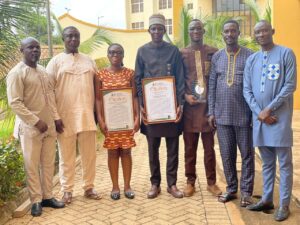The Department of Planning at Kwame Nkrumah University of Science and Technology (KNUST) celebrated the Ghana Student Planners Association (GASP) week, honoring journalists for their contributions to developmental reporting.
Among the honorees was Mona Lisa Frimpong, a journalist with Joy News and an alumna of the Department, who graduated with a Bachelor of Science in Development Planning in 2019.
Ms. Frimpong was recognized for her series of impactful stories on air pollution in Asokwa industrial enclave and the Sokoban Wood Village in the Ashanti Region.
Her reporting shed light on the severe health and environmental consequences faced by residents in these areas due to industrial activities and poor waste management practices.
By leveraging her academic background in development planning, Mona Lisa was able to present an analysis of the pollution issues, offering potential solutions and advocating for policy changes.
Her stories not only raised public awareness but also prompted discussions among policymakers and stakeholders, highlighting the urgent need for effective interventions to address air pollution.
Mona Lisa’s work exemplifies how academic training in development planning can be integrated into journalism to drive positive change and development in communities.

Ibrahim Abubakr of Media General in the Ashanti Region received the distinguished overall honors.
His award-winning story highlighted the plight of cocoa farmers in rural Ghana who were forced to sell their farms to illegal miners.
This piece highlighted the environmental and economic challenges in rural communities.
Akua Asieduwaa of Oyerepa FM in Ashanti was also honored for her contributions to developmental journalism.
Her talk shows have consistently shed light on pressing local issues, fostering public awareness and policy discussions.
A symposium held during the week featured keynote speakers who addressed critical topics in planning and development. Rt Rev. Professor Sarfo-Kantanka spoke on “Africa’s Leadership Challenges and Prospects,” focusing on preparing future leaders to tackle these challenges strategically.
Frank Tackie, CEO of The Consortium – Consulting Engineers, Architects, and Planners, discussed “Making Ghanaian Cities Resilient, Efficient, and Sustainable.”
He highlighted the cultural irrelevance of expatriate-prepared plans and emphasized the need for culturally relevant city planning in Ghana.
Challenges in city planning, such as inadequate housing and plan implementation dilemmas, were discussed.
“Planning is about people, their culture, and heritage, making it essential for plans to be culturally relevant. City planning in Ghana is more a governance issue than a technical one, “he said.
The symposium concluded with a call for the student association to become agents of change, advocating for a new approach to town planning that considers cultural relevance and addresses governance challenges.
The Department of Planning at KNUST offers courses in Settlement Planning and Development Planning.
These programs equip students with skills to address urban and rural development challenges, integrating planning principles into various sectors, including journalism.


